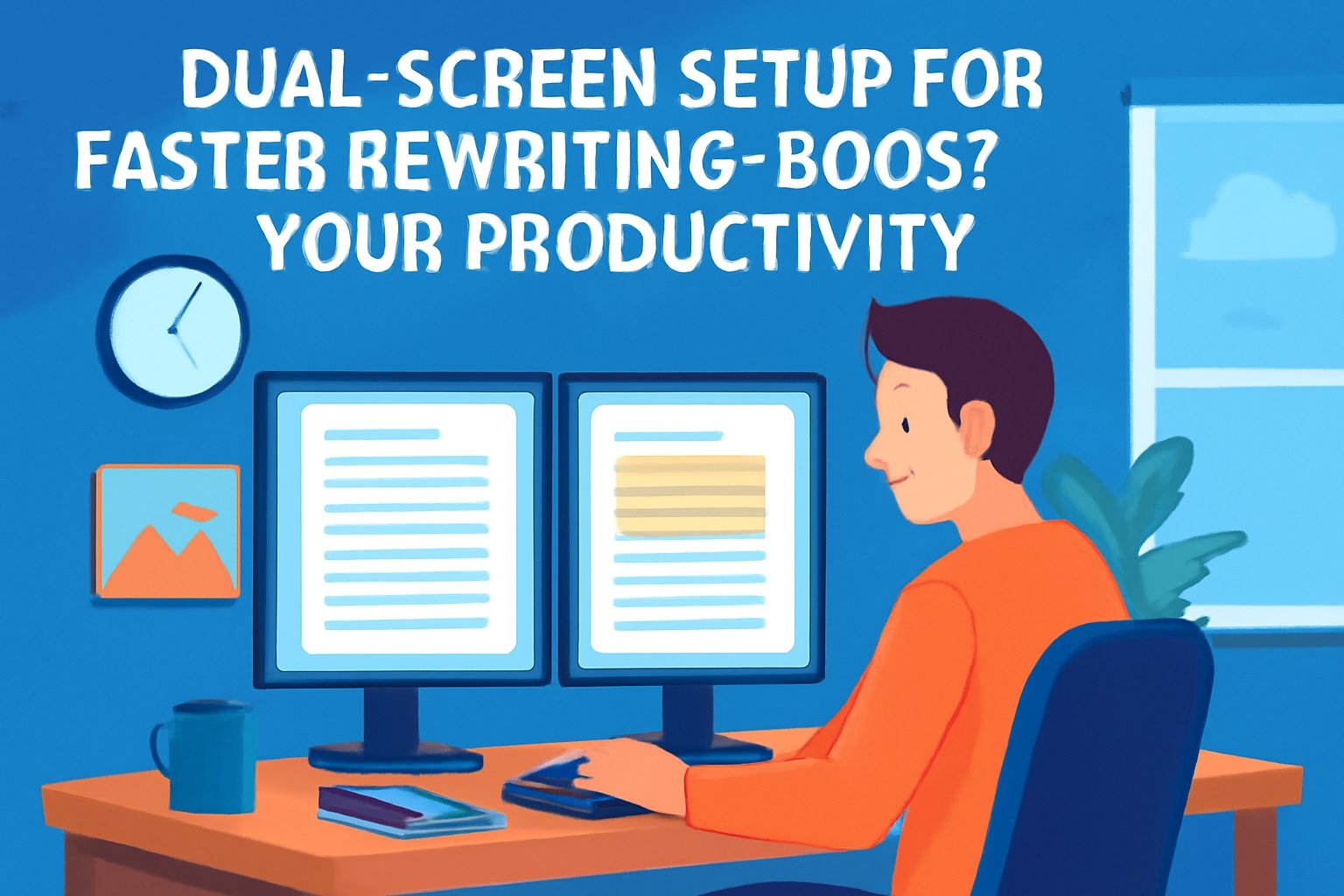What is a Dual-Screen Setup?
A dual-screen setup simply means connecting two screens to your computer. This can be your laptop and an extra monitor, or two standalone monitors. It’s common among gamers, writers, video editors, and now increasingly, content creators and researchers.
- Dual Monitor Setup: Two screens working together to extend your desktop space.
- Portable Options: Use a tablet or laptop as a second screen using software like Duet Display.
- Flexible Layouts: You can choose vertical or horizontal layouts depending on your work type.
The best layout for a dual-monitor setup depends on your workflow. Writers often prefer one screen for reading and one for editing or typing.
Why Rewriting Takes Time (and Energy)
Rewriting is more than just fixing grammar. It involves rephrasing ideas, ensuring clarity, and restructuring text. Here’s why it’s time-consuming:
- You constantly switch between source text and rewritten content
- Tabs and windows overlap, disrupting flow
- Copy-pasting creates distractions
Your brain works best when it has visual stability. Dual screens help by reducing this context-switching.
Dual-Screen Setup for Faster Rewriting: How It Helps
Improved Workflow
With two screens, you can place your original document on one and write the new version on the other. No alt-tabbing, no lost windows.
- Maintain paragraph flow
- Reference formatting, sources, or structure in real-time
- Better consistency across content pieces
Reduced Cognitive Load
Every switch between screens on one monitor costs you mental energy. Dual screens eliminate this strain:
- You focus fully on content instead of navigation
- Side-by-side comparison boosts rewriting speed
- Smooth transitions between thought and action
Multitasking Made Seamless
Need to research while rewriting? Want to run Grammarly, Hemingway, or ChatGPT on one screen? Done. Here’s what you can do with two screens:
- Research articles or tools on the left
- Rewrite and edit on the right
- Drag and drop ideas, links, or examples easily
Better Accuracy
Mistakes drop when your brain isn’t overloaded. Here’s how dual monitors reduce rewriting errors:
- Easy to check structure, grammar, and tone
- Less scrolling means better attention to detail
- Visual clarity improves sentence comparison
Tools and Hardware for Setting Up
Hardware You Need
| Item | Recommended Option |
|---|---|
| Second Monitor | 24-27 inch 1080p or higher |
| Monitor Stand or Arm | Adjustable with tilt/swivel |
| HDMI/USB-C/Docking Station | For easy connections |
| Ergonomic Keyboard/Mouse | For comfort and productivity |
Software and Settings
- Windows Snap (Windows 10/11): Organize windows instantly
- Display Settings: Adjust brightness, scaling, and resolution
- Clipboard Managers: Copy multiple snippets without switching back and forth
- Dual Screen Setup for Faster Rewriting Windows 10: Built-in tools make configuring screens quick
If you’re wondering how to adjust screen size on second monitor (Windows 11), go to Display Settings > Select Display > Scale and Layout. Match resolutions for consistency.
Optimizing the Second Screen for Maximum Speed
To get the most from your setup, optimization is key. Here’s how:
- Set both screens to the same resolution (if possible)
- Use Night Light or eye-friendly settings
- Set your editing tool (like Google Docs) to full screen
- Place less-used tools (email, chat) on the secondary screen
How to optimize a second screen?
- Match color temperature for uniform lighting
- Calibrate brightness and contrast
- Use taskbar on one screen only to reduce distractions
How to fix dual-monitor scaling?
- In Windows 11: Settings > System > Display > Scale > Set both to 100% or your preferred scale
- Avoid mixing 4K and 1080p monitors if not tech-savvy
Common Questions Answered
Will Dual Screens Affect PC Performance?
In most cases, no. But it depends on your system:
- Modern PCs easily support dual monitors
- For older PCs, use lightweight editing tools
- Gamers may need a better GPU to avoid frame drops
Dual Screen Setup for Faster Rewriting Gaming?
Yes! Writers who game can also benefit:
- Write walkthroughs or guides while playing
- Capture screenshots for tutorials
- Script and edit gaming content simultaneously
Best Way to Setup Dual Monitors on Desk
Here’s how to arrange your workspace:
- Primary Monitor: Center it with your keyboard
- Secondary Monitor: Slightly to the right or left
- Use a desk arm to free up space
- Keep screens at eye level to avoid neck strain
Use Cases: Who Should Use This Setup?
This isn’t just for bloggers. The dual-screen benefit applies to many:
- Academic Researchers: Read papers and write conclusions simultaneously
- Content Writers: Rewrite and optimize content quickly
- Journalists: Compare sources and quotes on-the-fly
- Translators: View original and translated versions together
- Technical Writers: Monitor code or data while documenting
Real Examples and Insights
Case Study: Rewriting an E-book
John, a freelance writer, rewrote a 10,000-word e-book. With dual screens, he:
- Finished the task in 4.5 hours (previously took 7+)
- Made 40% fewer errors (based on Grammarly analysis)
- Reduced eye strain by adjusting monitor brightness equally
Tips to Get the Most from Your Dual Screens
- Use Focus Mode in writing tools
- Disable desktop notifications during rewriting
- Use light mode on one screen, dark mode on another if preferred
- Keep your desk clean to reduce distraction
- Backup work regularly using cloud tools (Google Drive, OneDrive)
Common Myths Busted
- “Too expensive”: Monitors now start as low as $100
- “Hard to set up”: Most PCs auto-detect a second screen
- “Takes up space”: Wall mounts and vertical setups save desk area
Final Thoughts
A dual-screen setup for faster rewriting isn’t just a productivity hack it’s a game-changer. It lets you work smarter, not harder. You can stay focused, move faster, and deliver better content.

Academic editor turned AI copy pro, Sarah-Jane fuses research precision with smart storytelling. Her insights build trust, spark ideas, and elevate every word with real-world writing experience.

